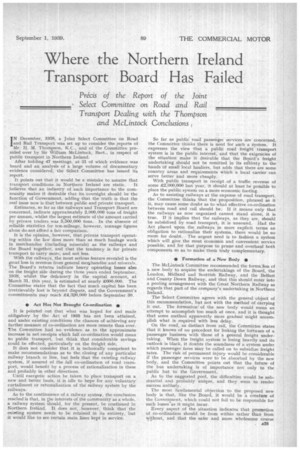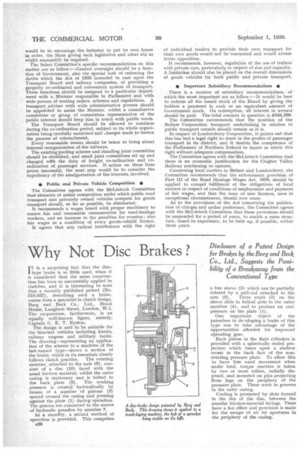Where the Northern Ireland Transport Board Has Failed
Page 27

Page 28

If you've noticed an error in this article please click here to report it so we can fix it.
Precis of the Report of the Joint Select Committee on Road and Rail Transport Dealing with the Thompson and McLintock Conclusions , ITN December, 1938, a Joint Select Committee on Road Rail Transport was set up to consider the „reports of Mr. H. M. Thompson, KG., and of the Committee presided over by Sir William McLintock, Bart., in respect of public transport in Northern Ireland.
After holding 47 meetings, at 31 of which evidence was heard and an analysis of a large volume of documentary evidence considered, the Seleet Committee has issued its report.
It points out that it would be a mistake to assume that transport conditions in Northern Ireland are static. It believes that an industry of such importance to the community makes it desirable that its oversight should be the function of Government, adding that the truth is that the real issue now is that between public and private transport.
Estimates, so far as the railways and Transport Board are concerned, indicate approximately 2,000,000 tons of freight per annum, whilst the largest estimate of the amount carried by private traders was 5,500,000 tons. In the absence of reliable statistics for ton-mileage, however, tonnage figures alone do not afford a fair comparison. • It is the opinion, however, that private transport operating within the law does more than as much haulage work in merchandise (including minerals) as the railways and the Board together, and that the tendency is for private transport to carry more, and not less.
With the railways, the most serious feature revealed is the great loss in revenue from general merchandise and minerals. The Board's returns indicate heavy operating losses also on the freight side during the three years ended September, 1938, whilst the deficiency in the capital account, at March 31, this year, is estimated at nearly i',600,000. The Committee states that the fact that much capital has been irretrievably lost is beyond dispute, and the Government's commitments may reach £4,320,000 before September 30.
• Act Has Not Brought Co-ordination •
It is pointed out that what was hoped for and made obligatory by the Act of 1935 has not been attained, and under existing conditions the chances of achieving any further measure of co-ordination are more remote than ever. The Committee had no evidence as to the approximate increase in net receipts which full co-ordination would mean to public transport, but think that considerable savings could be effected, particularly on the freight side.
It does not consider that it is technically competent to make recommendations as to the closing of any particular railway branch or line, but feels that the existing railway system, if assured of the full co-ordination of road transport, would benefit by a process of rationalization in these and probably in other directions.
Until energetic action be taken to place transport on a new and better basis, it is idle to hope for any voluntary curtailment or rationalization of the railway system by the railways.
As to the continuance of a railway systent, the conclusion reached is that, in the interests of the community as a whole, a railway system Should, for the present, be continued in Northern Ireland. It does not, however, think that the existing system needs to be retained in its entirety, but it would like to see certain main lines kept in service. So far as public road passenger services are concerned, the Committee thinks there is need for such a System. It expresses the view • that a public road freight transport system is in the public interest, and that the exigencies of the situation make it desirable that the Board's freight undertaking should not be remitted in its entirety to the hands of small local hauliers, but adds that there are some country areas and requirements which a local carrier can serve better and more cheaply.
With public transport in receipt of a traffic revenue of some £2,000,000 last year, it should at least be possible to place the public system on a more economic footing.
As to assisting railways at the expense of road transport, the Committee thinks that the proposition, phrased as it is, may cause some doubt as to what effective co-ordination between road and rail should be. If it means only that the railways as now organized cannot stand alone, it is true. If it implies that the' railways, as they are, should be subsidized by road transport, it is unsound, Had the Act placed upon the railways in more explicit terms an obligation to rationalize their systems, there would be no room for doubt. The urgent need is to fashion a system which will give the most economic and convenient service possible, and for that purpose to prune and overhaul both components so as to make them truly complementary.
• Formation of a New Body • The McLintock Committee recommended the forrnaion of a new body to acquire the undertakings of the Board, the London, Midland and Scottish Railway, and the Belfast and County Down Railway, and that this should enter into a pooling arrangement with the Great Northern Railway as regards that part of the company's undertaking in Northern Ireland.
The Select Committee agrees with the general object of this recommendation, but not with the method of carrying it out. The formation of the new body would mean an attempt to accomplish too much at once, and it is thought that some method apparently more gradual might accomplish what is required with less delay.
On the road, as distinct from rail, the Committee states that it knows of no precedent for linking the fortunes of a passenger business with those of a general freight undertaking. When the freight system is losing heavily and its outlook is black, it doubts the soundness of a system under which passenger fares may be called on to subsidize freight rates. The risk of permanent injury would be considerable if the passenger services were to be absorbed by the new body, and the Committee points out that the future of the bus undertaking is of importance not only to the public but to the Government.
As to the suggested pool, the difficulties would be substantial and probably unique, and they seem to render success unlikely.
The most fundamental objection to the proposed new body is that, like the Board, it would be a creature of the Government, which could not fail to be responsible for such losses.as it might incur.
Every aspect of the situation indicates that promotion of co-ordination should be from within rather than from without, and that the safer and more wholesome course , A25 would be to encourage the industry to put its own house in order, the State giving such legislative and other aid as might reasonably be required.
The Select Committee's specific recommendations on this matter are as follow :—General oversight should be a function of Government, also the special task of enforcing the duties which the Act of 1935 intended to cast upon the Transport Board and railway companies, of providing a properly co-ordinated and convenient system of transport. These functions should be assigned to a particular department with a Minister responsible to Parliament and with wide powers of making orders, schemes and regulations. A transport adviser with wide administrative powers should be appointed to assist the Minister, whilst a consultative committee or group of committees representative of the public interest should keep him in touch with public needs.
The Transport Board should be allowed to continue during the co-ordination period, subject to its whole organization being carefully examined and ...hanges made to hasten the process of retrenchment, Every reasonable means should be taken to bring about internal reorganization of the railways. The existing pooling scheme and standing joint committee should be abolished, and small joint committees set up and charged with the duty of freight co-ordination and coordination of passenger services. If action on these lines prove successful, the next step would be to consider the expediency of the amalgamation of the interests involved.
• Public and Private Vehicle Competition • The Committee agrees with the McLintock Committee that elements of unfair competition under which public road transport and privately owned vehicles compete for goods transport should, so far as possible, be eliminated. It recommends a wages board with proper machinery to ensure fair and reasonable remuneration for road-haulage workers, and an increase in the penalties for evasion ; also fair wages as a condition of every goods-vehicle licence.
It agrees that any radical interference with the right of individual traders to provide their own transport for their own goods would not be .warranted and would arouse bitter opposition.
It recommends, however, regulation of the use of trailers with private cars, particularly in respect of size and capacity. A limitation should also be placed on the overall dimensions of goods vehicles for both public and private transport.
• Important Subsidiary Recommendations • There is a number of subsidiary recommenclatiens, of which the most important are as follow :—It would he best to redeem all the issued stock of the Board by giving the holders a payment in cash or an equivalent amount of Government stock. On redemption, all interest in arrears should be paid. The total amount in question is £844,299.
The Committee recommends that the position of the Belfast Corporation transport undertaking in relation to public transport outside should remain as it is.
In respect of Londonderry Corporation, it points out that this has had a legal right to share in the profits of passenger transport in its district, and it doubts the competence of the Parliament of Northern Ireland to injure or retain this right without adequate compensation.
The Committee agrees with the McLintock Committee that there is no economic justification for the Clogher Valley Railway continuing to operate.
Concerning local carriers in Belfast and Londonderry, the Committee recommends that the enforcement provision of Part III of the Road Haulage Wages Act, 1938, should be applied to compel fulfilment of the obligations of local carriers in respect of conditions of employment and payment of fair wages, and that the issue of new licences, save in exceptional circumstances, should now cease.
As to the provisions of the Act concerning the publication of charges and undue preference, the Committee agrees with the McLintock Committee that these provisions should be suspended for a period of years, to enable a rates structure, based on experience, to be built up, if possible, within three years.




































































